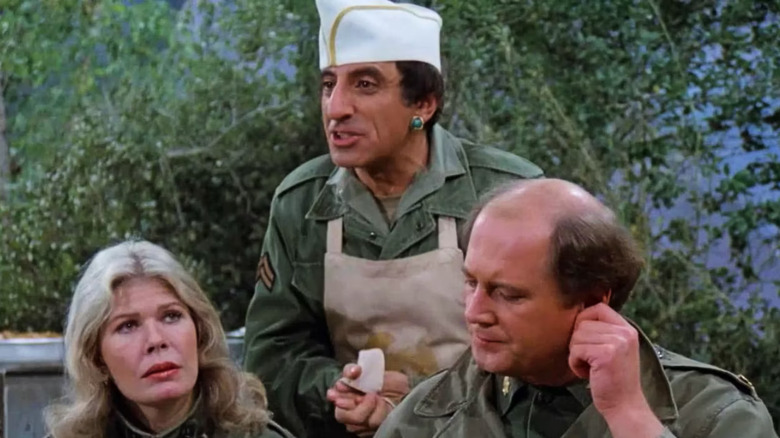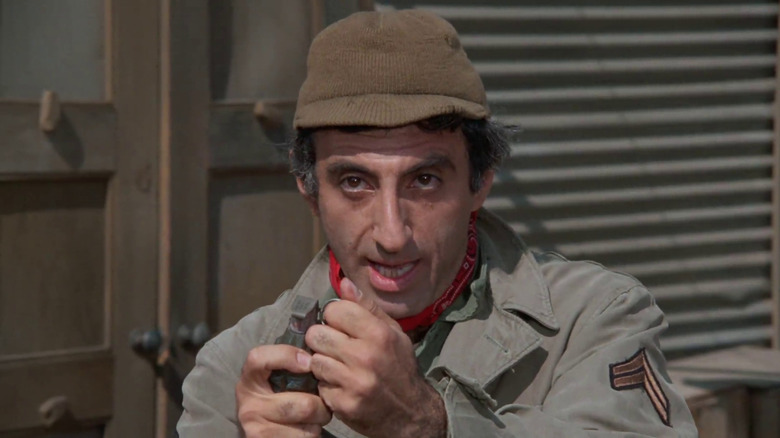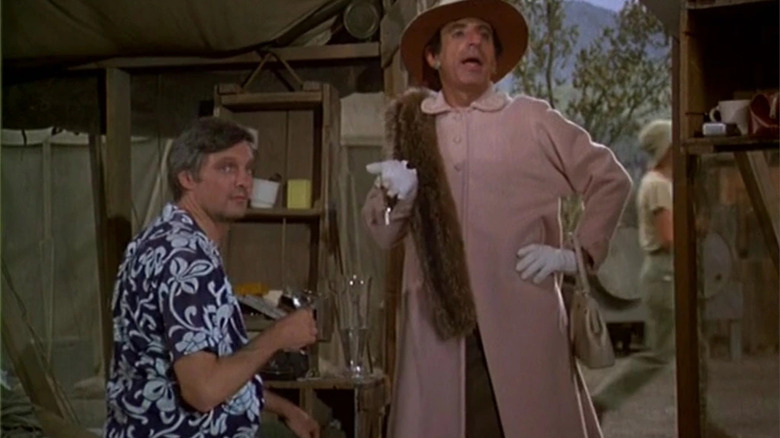The 1972 Korean warfare sitcom “M*A*S*H” has grow to be probably the most beloved tv reveals of all time, nevertheless it’s fascinating to look at simply how the collection evolves over the seasons. The collection was primarily based on Robert Altman’s 1970 movie of the identical title, which was in flip primarily based on the novel “MASH: A Novel About Three Military Medical doctors” by Richard Hooker, nevertheless it was a really totally different tackle the 4077th Cellular Military Surgical Hospital. Altman completely hated the collection and Hooker hated Hawkeye (Alan Alda), however collection creator Larry Gelbart actually knew what he was doing, even when he was clearly figuring it out as he went alongside.
Lots of the characters on the present are totally different variations of their film counterparts, however a couple of characters have been created only for the collection, and the primary one was Corporal Maxwell Klinger, performed by Jamie Farr. Klinger was an orderly who wished so desperately to get out of the Military that he would do something to get a Part 8 (a psychological well being discharge), together with carrying ladies’s clothes. Initially, Klinger was solely supposed to seem in that one episode, “Chief Surgeon Who?,” however he ended up getting a recurring position after which turning into a collection common. As problematic because the character might be, he is additionally top-of-the-line on the collection, and his evolution is without doubt one of the present’s nice hallmarks.
In an interview with the Smithsonian, Farr as soon as shared the complete historical past of how his character got here to be — from a one-day shoot with only a few strains to becoming a member of the solid of probably the most essential tv reveals of all time.
Klinger was solely meant to final one episode
Whereas talking with the Smithsonian, Farr defined that he was given the position as a result of he had labored with director Gene Reynolds on a earlier venture, and when Reynolds turned a producer on “M*A*S*H,” he wished Farr particularly. The actor was having a tough patch and hadn’t labored in a while, so he jumped on the probability for one thing that paid $250 for a day’s work. “It made such an affect that they known as me again, and I feel I did six extra of these first-year reveals, and that is how I obtained linked with the collection,” he defined. From that preliminary episode, Klinger ended up turning into a serious a part of the collection and was signed on with a contract in season 3. Heck, he even ended up being one of many few characters to make it to the (sadly ill-fated) spin-off collection, “AfterMASH.”
A lot of the characters on “M*A*S*H” actually grew and altered over the course of the collection (with one main exception), however Klinger undergoes probably the most dramatic change of all of them. He begins the collection as one thing of a recurring bit that makes use of his cross-dressing for laughs, a seemingly cowardly con man from Toledo who would do something to get out of the Military, however he finally ends up turning into probably the most selfless and devoted members of the unit by the finale. Farr’s efficiency is unbelievable, drawing from his personal army experiences in Korea, however sadly Klinger has a sophisticated legacy.
We have to speak about Klinger
Farr as soon as stated in an interview with Studio 10 that he felt as if Klinger “was like a cartoon character,” and within the early seasons particularly he is rambunctiously random in his desperation to get a army discharge. In a while, he realizes that he genuinely does really feel extra comfy in ladies’s clothes typically as a result of it is a type of armor towards the horrors of warfare, however that complexity takes time. That signifies that for a number of seasons, audiences are handled to a lot of terrible jokes about males in attire, the type of “humor” that may be genuinely dangerous to transgender folks. Klinger is just not trans and by no means pretends to be trans, however drag and crossdressing have been conflated with trans folks for many years, typically to the detriment of trans of us. It is a deeply advanced situation, and for a greater understanding, make sure you try the documentary “Disclosure” on Netflix, which offers some perspective from the folks this impacts most.
The U.S. army has an extended, painful historical past with LGBTQ servicemembers. Previous to “Do not Ask, Do not Inform” in 1994, anybody who wasn’t cisgender and heterosexual was deemed unfit for army service — and previous to 1982, being something apart from straight was categorized as a psychological sickness. There’s nothing psychologically unfit about LGBTQ folks, and this perception was used to demonize them. (There’s an entire dialog available about how society views psychological sickness as nicely, however that is a subject for one more “M*A*S*H” article.)
Klinger has a sophisticated legacy with some extraordinarily problematic materials within the early seasons that turns into one thing extra earnest. When he realizes that he truly is a crossdresser, the present stops treating him as “loopy,” and he finally ends up being steadfast and succesful. The later seasons appear to say that a bit of gender-bending has no actual bearing on an individual’s character in any method, which is wildly progressive for the Nineteen Seventies, nevertheless it takes some actually awkward stumbles earlier than getting there.
Corporal Klinger’s lasting legacy
Although these early seasons could be actually tough, the place Klinger finally ends up as a personality makes up for it considerably. He began “M*A*S*H” as a irritating one-note joke, and since non-binary and trans characters nonetheless have a tough time getting optimistic illustration, it may be particularly upsetting. Up to date takes on his cross-dressing are blended, with some transgender of us arguing that the “males in attire” trope is simply too dangerous to disregard, whereas others see is as a sophisticated however finally optimistic semi-representation. It is the type of factor that everybody wants to find out for themselves, however I personally really feel like Klinger turns into a really essential and well-rounded character over time — a person judged by his character and never the garments he chooses to put on. “M*A*S*H” had its coronary heart in the proper place more often than not, and even had an episode the place Hawkeye and Trapper (Wayne Rogers) assist a gay soldier attempt to keep away from being kicked out of the military.
Maybe as a result of Klinger was created on the fly and wasn’t initially purported to be round for multiple episode, he took a bit of longer to essentially grow to be an integral (and non-problematic) a part of the 4077th. In the long run, “M*A*S*H” reignited Farr’s profession like by no means earlier than, and Corporal Klinger stole all of our hearts and made us chuckle.











